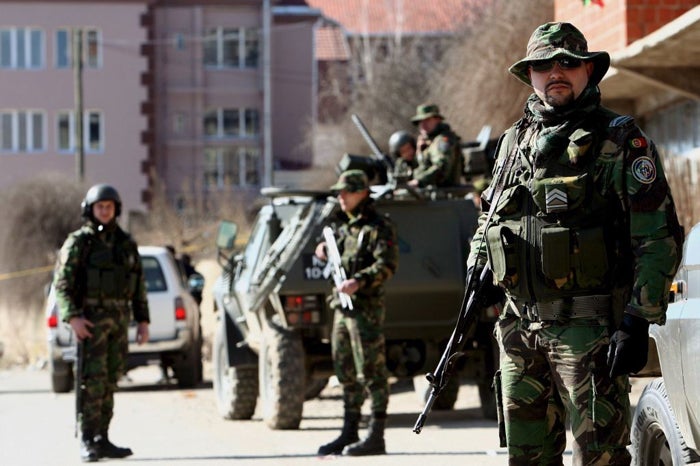Nato vows to protect north border of newborn Kosovo

Your support helps us to tell the story
From reproductive rights to climate change to Big Tech, The Independent is on the ground when the story is developing. Whether it's investigating the financials of Elon Musk's pro-Trump PAC or producing our latest documentary, 'The A Word', which shines a light on the American women fighting for reproductive rights, we know how important it is to parse out the facts from the messaging.
At such a critical moment in US history, we need reporters on the ground. Your donation allows us to keep sending journalists to speak to both sides of the story.
The Independent is trusted by Americans across the entire political spectrum. And unlike many other quality news outlets, we choose not to lock Americans out of our reporting and analysis with paywalls. We believe quality journalism should be available to everyone, paid for by those who can afford it.
Your support makes all the difference.The commander of the Nato force in Kosovo has moved swiftly to assert its authority on the newborn nation's northern border.
Lt-Gen Xavier de Marnhac, commander of the Nato-led peacekeeping force, Kfor said the posts destroyed on Tuesday would be rebuilt and re-manned. "I just want everyone to be fully aware of my determination to maintain [and] restore a safe and secure environment in Kosovo," he insisted.
While 90 per cent of Kosovo's population is Albanian, the northernmost four districts, including the divided city of Mitrovica, are overwhelmingly Serb.
On Tuesday, Kfor police manning two border posts between these four districts and Serbia were forced to hide in a tunnel as their posts were destroyed by state-sanctioned hooligans. Serbia has refused to recognise Kosovo's declaration of independence last Sunday. After the sheds were destroyed, Serbia's minister for Kosovo, Slobodan Samardzic, said the action was "not nice but legitimate".
Yesterday the Serb-dominated North Mitrovica saw another protest against Kosovo's independence and against the EU mission being sent to support the fledgling state's police, judiciary and customs. But there were no reports of fresh violence.
The Serbian Foreign minister Vuk Jeremic said in Strasbourg that Serbia's relations with states recognising Kosovo's independence had been irreparably damaged. "Relations with those states cannot be as before," he insisted. "None of the countries can count on having exactly the same relations with Serbia." Serbia is withdrawing its ambassadors from countries that recognise Kosovo, including the US, Britain, France, Germany and Austria.
Mr Veremic was careful, however, to make clear that Belgrade's argument is with individual countries not with the EU as a whole – which Serbia still aspires to join before too long.
Russia – whose unexpected UN Security Council veto last year of the plan for Kosovo's "internationally supervised independence" threw the whole process of Kosovo's emancipation from UN control into disarray – continued to heap on the pressure. Its Foreign minister Sergey Lavrov said that the EU's mission to bolster Kosovo's police, customs and justice system was itself illegal. "The EU, unilaterally, without any approval from the UN Security Council, is sending a mission to Kosovo to provide for the rule of law," he said. "There is bitter irony ... in this, because the mission is ... being sent in violation of the highest law – in violation of international law."
The new man in the hot seat in Pristina, Dutchman Pieter Feith – who arrived on Tuesday to take up his new posts as both the EU's Special Representative in Kosovo, and the International Civilian Representative – insisted that "the EU mission is legal", and that its writ will extend throughout the country. "We are going to deploy our mission that will bring the rule of law in the coming months," he said. "We should see this as an opportunity to establish a multi-ethnic justice system also in the north."
The EU mission he will head will not be fully operational for some time, up to four months, while the International Civilian Office he will head is also in the process of coming together.
It would be surprising if these were not tense days within the embryonic EU mission, which is also bringing nearly 2,000 experts to overhaul Kosovo's police, justice and customs systems. The EU has never attempted anything half this bold before – to nurture a new country from birth to be fit for accession to the EU. Nor has it done so in the teeth not only of the rage of Russian and Serbia, but the disapproval of many EU members.
It has to do all this in circumstances that were not envisaged when the plan it is following was drawn up. The plan for Kosovo's independence was meant to be implemented once the UN Security Council had given its stamp of approval. But that never happened.
Join our commenting forum
Join thought-provoking conversations, follow other Independent readers and see their replies
Comments